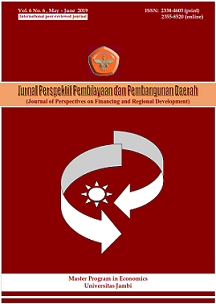The suitability of cryptocurrency in the structure of Islamic banking and finance
DOI:
https://doi.org/10.22437/ppd.v6i6.6603Abstract
This paper tends to examine cryptocurrency and its permissibility in the structure of Islamic banking finance. It identifies the major types of cryptocurrencies and also revealed its benefits. Despite these benefits and relating it to Islamic finance it was viewed from two angle; cryptocurrency and money in Islam and also cryptocurrency and the principles of Islamic finance. The study revealed it is compatible to structure of Islamic banking and finance when compared side by side to the features of fiat money which is currently in use. More so, the study clears some of the key issues like its legal tender, issuer unknown, money laundering & illicit purpose etc usually raised against cryptocurrency. The study concluded that cryptocurrency as an economic innovation has secured a pass mark to fit into the structure of Islamic banking and finance. The study further recommends that there is need to create standards guiding its operations, further ensure full disclosure on its transactions etc.
Downloads
References
Abu-Bakar, M., M. (2017). Shariah Analysis of Bitcoin, Cryptocurrency and Blockchain. Working paper, Blossom Lab Inc.
Anwar, M., & Haque, Z. (1993). Strategies to Settle Existing Debts under an Islamised Banking System. The Pakistan Development Review, 32(4), 961-971.
Barker, D. (2013). Is Bitcoin Sharia Compliant. Retrieved November 23, 2018 from https://dailyanarchist.com/2013/01/30/is-bitcoin-sharia-compliant.
Charles, W.E. (2015). Bitcoin in Islamic Banking and Finance. Journal of Islamic Banking and Finance. 3(1). 1-11
CoinDesk Research, (2016). State of Bitcoin 2016. Retrieved from http://coindesk.com/ research/state-bitcoin-blockchain-2016
Cointelegraph. (2018). What is Bitcoin? History, Characteristics, pros and cons. Retrieved November 23, 2018 from https://cointelegraph.com/bitcoin-for-beginners/what-is-bitcoin.
Empirica. (2018). Different types of Cryptocurrency. Retrieved January 19, 2018 from https://empirica.io/blog/different-types-cryptocurrency
Hosein, I. (2011). What is Money in Islam. Retrieved from https://m.youtube.com/ watch?v=ISmRKPf1Jho.
Investopedia. (2018). Cryptocurrency. Retrieved January 19, 2018 from https://www.investopedia. com/terms/c/cryptocurrency/.asp
Kamar, A., Norat M., Pinon M., Prasad A., Towe, C., Zeidaine, Z & IMF Staff Team (2015). Islamic Finance: opportunities, Challenges and policy Options. IMF Staff Discussion Note: 8-11 & 26
Mathew.(2018) . What is Bitcoin? History, Characteristics, pros and cons. Retrieved November 23, 2018 from https://cointelegraph.com/bitcoin-for-beginners/what-is-bitcoin.
Muedini, F. (2018). The Compatibility of Cryptocurrencies and Islamic Finance. European Journal of Islamic Finance. 10. 1-10
Nakamoto, S. (2008). Bitcoin: A Peer to Peer Electronic Cash System. In Alexander, D., Peter, L., & Zintis (2016).The Future of Cryptocurrency: An Investor’s Comparism of Bitcoin & Ethereum. Ryerson University. 1-18
The European Central Bank (2015). Virtual currency schemes: A further analysis. Germany: European Central Bank
Wikipedia (2018a). Cryptocurrency. Retrieved February 5, 2018 from https://en.wikipedia.org/ wiki/ Cryptocurrency.
Wikipedia (2018b). Bangladesh Bank robbery. Retrieved April 04, 2018, from https://en.wikipedia.org/wiki/Bangladesh_Bank_robbery
Downloads
Published
How to Cite
Issue
Section
License
Copyright (c) 2019 Ibrahim Mohammed Lawal

This work is licensed under a Creative Commons Attribution 4.0 International License.












